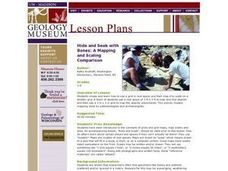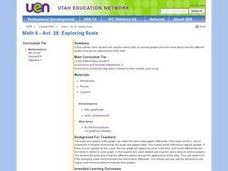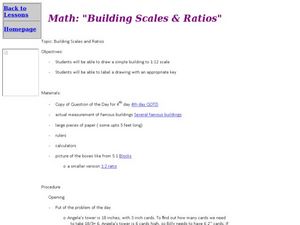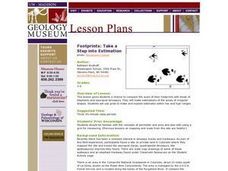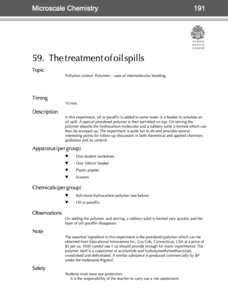Curated OER
Hide and Seek with Bones: A Mapping and Scaling Comparison
Students examine and simulate how paleontologists map objects. They hide and find objects using a grid to map the objects' placements.
Curated OER
Map Scale and the Pioneer Journey
Fourth graders, using a map, ruler and calculator, determine the distance the pioneers traveled from Nauvoo, Ill. to the Salt Lake Valley.
Curated OER
Blue Jazz Scale
Students engage in a study of music that includes the Blue Jazz scale. They listen to pieces of music in the targeted style while becoming familiar with the scale. Students then describe how the scale is built and demonstrate by playing...
Curated OER
The Geologic Time Scale
Students research and explore the earth's past and make comparisons with the earth's present. They map out a timeline that explains how the earth and its organisms have changed over time. Studnets create a scale for their time line, they...
Curated OER
Exploring Scale
Sixth graders discuss how the scale and type of graph can change how the data appears. With a partner, they identify all the information about the graph in a specific amount of time and record them in a journal. To end the lesson, they...
Curated OER
Unit 19 Scale Drawing
In these scale drawing worksheets, students read the distance problems and select the answer from the choices. Students complete 9 problems.
Curated OER
Building Scales and Ratios
Students solve problems using scales and ratios. In this algebra instructional activity, students create drawings using scales of 1:12. They follow a key to help them draw different buildings using the right scales. They also complete...
National Nanotechnology Infrastructure Network
The Micro and Macro World Around Us
Don't let your eyes play tricks on you ... use scale to keep your eyes in check! Young scholars observe images without scale and try to identify the structure. Then, they look at the same image with a scale bar and assess whether their...
Curated OER
Evaluating an Illinois Earthquake
Young scholars develop awareness of occurrences of earthquakes in Illinois and their past and potential future damage, and examine distribution of earthquakes in central U.S. regions.
Curated OER
Draw an Inch, Walk a Mile
Students work in small groups to solve the problems presented. The main project, mapping the classroom, use these discussions to collaborate in creating a tangible demonstration of their understanding.
American Museum of Natural History
Solar System Scavenger Hunt
Scholars go on a hunt to locate objects that best fit the measurements to create an eye-catching scale model of the solar system.
CCSS Math Activities
Smarter Balanced Sample Items: 7th Grade Math – Target E
How well do your classes understand scale? You'll certainly know after they answer the set of eight questions from an informative and helpful presentation. Questions include items from coordinate geometry, similar triangles, and scale...
TryEngineering
Exploring at the Nanoscale
Discover a world too small to see. In the lesson, young scientists learn about nanotechnology and brainstorm ideas for new applications of it. They perform an activity to determine how surface area changes when objects are made smaller...
Curated OER
Footprints: Take a Step into Estimation
Compare sizes of student footprints with those of elephants and sauropod dinosaurs! Upper graders make estimations of the areas of irregular shapes; students use grids to make and explain estimates within low and high ranges.
Laboratory for Atmospheric and Space Physics
Jupiter’s Relative Size
How do you properly illustrate the extreme size difference between two planets—Earth and Jupiter? With the help of jellybeans, of course! Create a scale model of Jupiter's mass compared to Earth using a fishbowl, 1,400 beans, and a...
EngageNY
End-of-Module Assessment Task: Grade 7 Mathematics Module 4
Asses the class to determine their knowledge of proportional relationships involving percents. Class members work through the nine-question assessment with a variety of percent problems. The multi-step problems involve simple interest,...
EngageNY
Drawing the Coordinate Plane and Points on the Plane
To plot a point in the coordinate plane, you first need a coordinate plane. Pupils learn to draw an appropriate set of axes with labels on a coordinate plane. They must also determine a reasonable scale to plot given coordinate pairs on...
Corbett Maths
Enlargements
Count on the scale to enlarge a figure. The video shows how to create an enlargement given a scale factor and a center of enlargement. The presenter multiplies the vertical and horizontal distance by the scale factor to find the new...
California Mathematics Project
Model Solar System
The sun's diameter is 864,337 miles—challenge learners to create a scale model of the solar system that fits in your classroom. Scholars make conversions and work with scientific notation as they create the scale model.
Royal Society of Chemistry
The Treatment of Oil Spills—Microscale Chemistry
When oil spills happen, how is the oil cleaned up? Pupils of polymer science discover an amazing substance that turns oil into a solid during a microscale experiment. Individuals observe oil or paraffin before and after addition of the...
CK-12 Foundation
Area and Volume of Similar Solids: Similar Solids
Five questions make up an interactive designed to boosts knowledge of area and volume of solid figures. Question types include multiple-choice, true or false, and fill-in-the-blank. A scale model changes measurement to provide a visual...
Radford University
The Wheels on the Bus
Find a cheaper way to keep buses going round and round. Small groups use their knowledge of ratios and proportions to find ways to save money on school transportation. The teams determine the number of miles buses currently travel by...
Curated OER
Lesson #2 ~ Nanoscience and Nanotechnology
You might love this lesson, or you might not. Basically, high school scientists read through a script in which someone interviews a physicist, a biologist, and a chemist in regard to their use of nanotechnology. The names of the involved...
Curated OER
Our Solar System - Comparing Planetary Travel Distances
NASA presents a mini-unit on distances in our solar system. It incorporates scientific concepts of gravity, mass, density, and payload while your aspiring astronauts also employ mathematics skills. They calculate speed, they determine...
Other popular searches
- Scale Drawings
- Balance Scale
- Ph Scale
- Scale Factor
- Geologic Time Scale
- Richter Scale
- Construct Scale Drawings
- Map Scales
- Balance Scale With Grams
- Scale Models
- Using a Map Scale
- Celsius Scale
